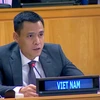National Assembly deputies focused their discussion on amendments to the Land Law in Hanoi on November 19.
Many deputies agreed on the need to revise the law, saying that over the past 10 years, the 2003 Land Law has recorded positive results but also revealed limitations in land use planning, compensation, site clearance, land price fixing, resettlement assistance and administrative procedures.
Deputies noted the wasteful and ineffective use of land in many localities, corruption and negative incidents in the field, and complicated developments in land complaints, accusations and disputes.
The amendment to the law must meet requirements in socio-economic development and the economical and effective use of land resources as well as raising the efficiency and effectiveness of State land management. It should also strengthen the role of State land management agencies from central to local levels, said lawmakers.
Many deputies agreed with a regulation on land use planning at national, provincial and district levels. Accordingly, land use planning of socio-economic zones will be included in the national-level plan while district-level plans will be made in detail for each communal-level administration unit.
However, others suggested the continuation of the four-level land use plan, of which the national-, provincial- and district-level plans are high-level plans, whilst the communal plan’s detailed design is to serve land management work.
Regarding the land revoking mechanism, deputy Than Duc Nam from central Da Nang city said that it is necessary to diversify land allocation and revoking forms in order to make them suitable for each land type.
Several deputies proposed that in the course of revoking land, the State should compensate land users according to the market price or in other words, buying back their land use right according to the market price.
Other deputies discussed revoking land for building factories, industrial zones, resorts and golf courses, noting that a number of projects wasted land while farmers went without land for cultivation, resulting in dissatisfaction among people and increasing complaints.
Compensation and resettlement assistance for revoked land also concerned the deputies, who said that it is the reason for increasing land complaints.
The draft law needs to contain comprehensive amendments to regulations on compensation, assistance and resettlement for revoked land, they stressed.
At the debate, deputies further commented on the revoking of land due to violations; land revoking competence, allocation and leasing; transferring land use purposes; granting land use right certificates; ownership of houses and other assets attached to land; and auctioning land use rights./.
Many deputies agreed on the need to revise the law, saying that over the past 10 years, the 2003 Land Law has recorded positive results but also revealed limitations in land use planning, compensation, site clearance, land price fixing, resettlement assistance and administrative procedures.
Deputies noted the wasteful and ineffective use of land in many localities, corruption and negative incidents in the field, and complicated developments in land complaints, accusations and disputes.
The amendment to the law must meet requirements in socio-economic development and the economical and effective use of land resources as well as raising the efficiency and effectiveness of State land management. It should also strengthen the role of State land management agencies from central to local levels, said lawmakers.
Many deputies agreed with a regulation on land use planning at national, provincial and district levels. Accordingly, land use planning of socio-economic zones will be included in the national-level plan while district-level plans will be made in detail for each communal-level administration unit.
However, others suggested the continuation of the four-level land use plan, of which the national-, provincial- and district-level plans are high-level plans, whilst the communal plan’s detailed design is to serve land management work.
Regarding the land revoking mechanism, deputy Than Duc Nam from central Da Nang city said that it is necessary to diversify land allocation and revoking forms in order to make them suitable for each land type.
Several deputies proposed that in the course of revoking land, the State should compensate land users according to the market price or in other words, buying back their land use right according to the market price.
Other deputies discussed revoking land for building factories, industrial zones, resorts and golf courses, noting that a number of projects wasted land while farmers went without land for cultivation, resulting in dissatisfaction among people and increasing complaints.
Compensation and resettlement assistance for revoked land also concerned the deputies, who said that it is the reason for increasing land complaints.
The draft law needs to contain comprehensive amendments to regulations on compensation, assistance and resettlement for revoked land, they stressed.
At the debate, deputies further commented on the revoking of land due to violations; land revoking competence, allocation and leasing; transferring land use purposes; granting land use right certificates; ownership of houses and other assets attached to land; and auctioning land use rights./.



















